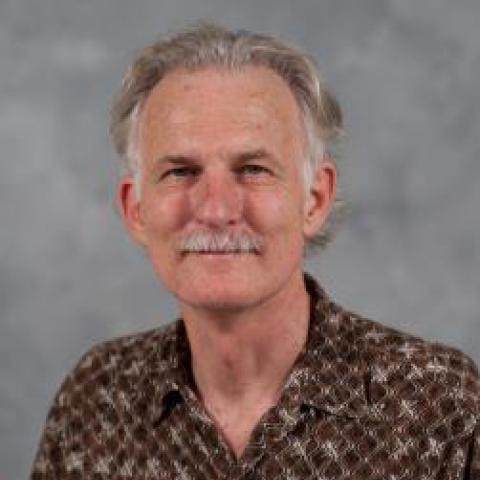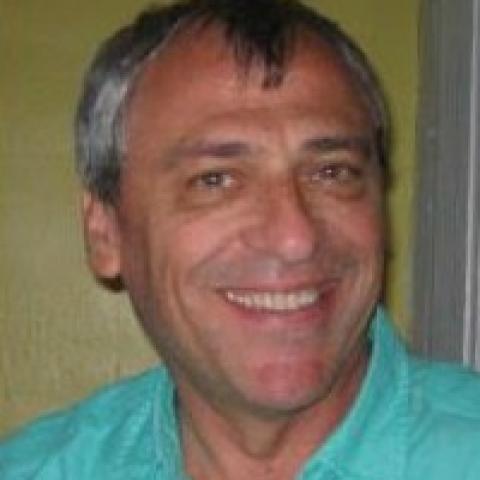Thomas DeChristina



Walter Alexander “Walt” de Heer is a Dutch physicist and nanoscience researcher known for discoveries in the electronic shell structure of metal clusters, magnetism in transition metal clusters, field emission and ballistic conduction in carbon nanotubes, and graphene-based electronics.
De Heer earned a doctoral degree in Physics from the University of California, Berkeley in 1986 under the supervision of Walter D. Knight. He worked at the École Polytechnique Fédérale de Lausanne in Switzerland from 1987 to 1997, and is currently a Regents' Professor of Physics at the Georgia Institute of Technology. He directs the Epitaxial Graphene Laboratory in the School of Physics and leads the Epitaxial Graphene Interdisciplinary Research Group at the Georgia Tech Materials Research Science and Engineering Center.
Electronics; Carbon Nanotubes; Epitaxial Growth; Graphene; Nanomaterials; quantum materials

Dragomir Davidovic's research focuses on the exploration of physical properties that emerge in objects when their size approaches nanometer-scale. The objects of study are metallic or insulating particles, molecules, atomic-scale diameter wires, and droplets of one phase surrounded by another phase. Recent advances in lithography enable attachment of these objects to larger scale conducting electrodes, making it possible to explore their physical properties by electronic transport. The properties of nanoscale objects can be fundamentally different from those in bulk. As an example, whereas in bulk metals, the energy spectrum of conduction electrons is continuous, in metallic nanoparticles the spectrum is discrete. As a result, metallic nanoparticles are more like atoms than bulk metals, and nanoparticles are commonly referred to as artificial atoms.
Electron Microscopy; Ferroelectronic Materials; Nanomaterials

3D printing; Additive/Advanced Manufacturing; Biomaterials; Composites; Emerging Technologies; Nanocomposites; Nanomanufacturing; Manufacturing, Mechanics of Materials, Bioengineering, and Micro and Nano Engineering. Advanced manufacturing and materials processing of metallic, polymeric, ceramic, and composite materials for applications in life sciences, propulsion, and energy. Professor Das directs the Direct Digital Manufacturing Laboratory and Research Group at Georgia Tech. His research interests encompass a broad variety of interdisciplinary topics under the overall framework of advanced design, prototyping, direct digital manufacturing, and materials processing particularly to address emerging research issues in life sciences, propulsion, and energy. His ultIMaTe objectives are to investigate the science and design of innovative processing techniques for advanced materials and to invent new manufacturing methods for fabricating devices with unprecedented functionality that can yield dramatic improvements in performance, properties and costs.

Sheng Dai, Ph.D., P.E., earned his degrees from Tongji University and Georgia Tech. He worked as an ORISE postdoc at the National Energy Technology Laboratory of the U.S. Department of Energy, and returned to Georgia Tech as a faculty member in 2015. He is currently an associate professor in the School of Civil and Environmental Engineering, Ocean Science and Engineering. and holds a courtesy appointment at the School of Earth and Atmospheric Sciences at Georgia Tech.
Dr. Dai's group addresses emerging energy and environment challenges through studying subsurface geomechanics, geomaterials characterization, energy geotechnics, bio-inspired geotechnics, flow in porous media, and granular dynamics. His research has been funded by federal funding agencies (DOE, NSF, NASA, DOT), national labs (INL, NETL), and industry (AECOM, GTI, Leidos). Dr. Dai has been recognized for his research and teaching, including being a recipient of the NSF CAREER award, the ORISE Fellowship, the Bill Schutz Junior Faculty Teaching Award, and the Class of 1969 Teaching Fellows at Georgia Tech.
He is an associated editor of the Journal of Geophysical Research: Solid Earth and Advances in Geo-Energy Research, an editorial advisor of Geomechanics for Energy and Environment, and serves on the Pressure Core Advisory Board for U.S. Geological Survey, the GOM2 Marine Test Technical Advisory Committee for UT/DOE, the National Gas Hydrate Program for NETL, and the Task Force Leader of TC308 Energy Geotechnics of ISSMGE.

I am an Assistant Professor at Georgia Tech ISyE. My research concerns the control and operation of decarbonized power systems, particularly with the integration of flexible loads such as electric vehicles. I got my Ph.D. from the University of Oxford in the Energy and Power Group, and completed my postdoc in the GRIFFIN Lab at CU Boulder.

Juan-Pablo Correa-Baena is an Assistant Professor and the Goizueta Junior Faculty Rotating Chair in the School of Materials Science and Engineering at the Georgia Institute of Technology in Atlanta, USA.
His group focuses on understanding and control of crystallographic structure and effects on electronic dynamics at the nanoscale of low-cost semiconductors for optoelectronic applications. Juan-Pablo’s group works on advanced deposition techniques, with emphasis on low-cost and high throughput, as well as advanced characterization methods that include synchrotron-based mapping and imaging approaches with nanoscale resolution.
His research program at Georgia Tech has attracted funding from the Department of Energy and the Department of Defense, which funds cutting-edge research on new materials for solar energy conversion.
His work has been cited over 28,000 times (h-index of 59) making him a top cited researcher as recognized by the Web of Science Group, Highly Cited Researchers-cross-field (2019, 2021) and Chemistry (2020), and Nature Index, Leading early career researcher in materials science (2019).


Tom Conte holds a joint appointment in the Schools of Electrical & Computer Engineering and Computer Science at the Georgia Institute of Technology. He is the founding director of the Center for Research into Novel Computing Hierarchies (CRNCH). His research is in the areas of computer architecture and compiler optimization, with emphasis on manycore architectures, microprocessor architectures, back-end compiler code generation, architectural performance evaluation and embedded computer system architectures.
Computer Architecture; Compiler Optimization

Baratunde A. Cola is a professor in the George W. Woodruff School of Mechanical Engineering and the School of Materials Science and Engineering at the Georgia Institute of Technology. He received his degrees from Vanderbilt University and Purdue University, all in mechanical engineering, and was a starting fullback on the Vanderbilt football team as an undergrad. Cola has received a number of prestigious early career research awards including the Presidential Early Career Award for Scientist and Engineers (PECASE) in 2012 from President Obama for his work in nanotechnology, energy, and outreach to high school art and science teachers and students; the AAAS Early Career Award for Public Engagement with Science in 2013; and the 2015 Bergles-Rohsenow Young Investigator Award in Heat Transfer from the American Society of Mechanical Engineers. In addition to research and teaching, Cola is the founder and CEO of Carbice Corporation, which sells a leading thermal management solution for the global electronics industry.
Carbon Nanotubes; Electronic Materials; Heat Transfer; Integrated Photonics; Nanoelectronics